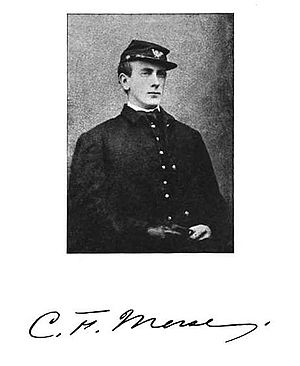- Charles Fessenden Morse
-
Not to be confused with Charles E. Morse.
Charles Fessenden Morse 
Photo and signature of Charles Fessenden MorseBorn September 22, 1839
Boston, MassachusettsDied December 11, 1926 (aged 87) Buried at Oak Grove Cemetery, Falmouth, Massachusetts[1] Allegiance United States of America
UnionService/branch Union Army Years of service 1861 – 1865 Rank Lieutenant Colonel Unit 2nd Massachusetts Volunteer Infantry Commands held 2nd Massachusetts Volunteer Infantry Battles/wars Battle of Gettysburg Other work Letters written during the Civil War, 1861-1865 Charles Fessenden Morse (September 22, 1839 – December 11, 1926) was a Lieutenant Colonel in the Union Army during the American Civil War and, afterward, an influential businessman and civic leader in Kansas City, Missouri.[2]
Contents
Early life
Morse was born in Boston and spent his childhood there. He attended Harvard University, graduating in 1858 with an S.B. degree.[3]
Civil War
Business career
In 1878, Morse left his post as general manager of the Atchison, Topeka and Santa Fe Railway in Topeka, Kansas at the suggestion of his friend, Charles Francis Adams, Jr., and relocated to Kansas City, where he served first as general manager and eventually president of the Kansas City Stockyards. Morse also served for several years as president of the Kansas City Metropolitan Street Railway company. He was one of the first residents of the city's exclusive Hyde Park district, a gated suburb established outside the city limits near the frontier town of Westport in 1882. During the 1880s and 1890s, Col. Morse helped establish several elite civic institutions, including The Barstow School and the Kansas City Country Club. Morse maintained a summer residence in Falmouth, Massachusetts, to which he retired in 1913.[4]
In popular culture
A young Captain Morse was portrayed by Donovan Leitch, Jr. in the 1989 film Glory. This appearance was fictionalized - Morse was a close friend and associate of Robert Gould Shaw, with whom he served in the 2nd Massachusetts Volunteer Infantry. The two maintained near daily-correspondence until the latter's death in the Battle of Fort Wagner in July 1863, and their battlefield letters served as primary sources for the books that inspired the film.[5]
See also
References
- ^ Gregory Speciale (2006-01-17). "Col Charles Fessenden Morse". Find A Grave. http://www.findagrave.com/cgi-bin/fg.cgi?page=gr&GRid=13045800. Retrieved 2008-11-22.
- ^ Conrads, David (1999). "Charles F. Morse". Missouri Valley Special Collections. Kansas City Public Library. http://www.kchistory.org/u?/Biographies,264. Retrieved 2008-11-24.
- ^ "Morse, Charles F. (Charles Fessenden), 1839-1926. Charles Fessenden Morse addresses on the Civil War, etc.: Guide.". Houghton Library, Harvard College Library. December 22, 2009. http://oasis.lib.harvard.edu/oasis/deliver/~hou00194. Retrieved June 9, 2011.
- ^ A sketch of my life written for my children and A buffalo hunt in Nebraska in 1871 (Cambridge : Privately printed at the Riverside Press, 1927).
- ^ Lawson, Brenda M. (1990). The Letters of Robert Gould Shaw at the Massachusetts Historical Society.. Massachusetts Historical Society.
External links
Categories:- 1839 births
- 1926 deaths
- Union Army officers
- Harvard University alumni
- People from Boston, Massachusetts
Wikimedia Foundation. 2010.
